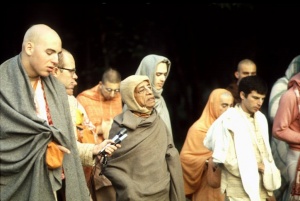CC Madhya 13.137 (1975)

A.C. Bhaktivedanta Swami Prabhupada
TEXT 137
- anyera hṛda ya-mana, mora mana-vṛndāvana,
- 'mane' 'vane' eka kari' jāni
- tāhāṅ tomāra pada-dvaya, karāha yadi udaya,
- tabe tomāra pūrṇa kṛpā māni
SYNONYMS
anyera—of others; hṛdaya—consciousness; mana—mind; mora mana—My mind; vṛndāvana—Vṛndāvana consciousness; mane—with the mind; vane—with Vṛndāvana; eka kari'-as one and the same; jāni—I know; tāhāṅ—there, at Vṛndāvana; tomāra—Your; pada-dvaya—two lotus feet; karāha—You do; yadi—if; udaya—appearance; tabe—then; tomāra—Your; pūrṇa—complete; kṛpā—mercy; māni—I accept.
TRANSLATION
Speaking in the mood of Śrīmatī Rādhārāṇī, Caitanya Mahāprabhu said, " 'For most people, the mind and heart are one, but because My mind is never separated from Vṛndāvana, I consider My mind and Vṛndāvana to be one. My mind is already Vṛndāvana, and since You like Vṛndāvana, will You please place Your lotus feet there? I would deem that Your full mercy.
PURPORT
Only when the mind is free from designations can one desire the association of the Supreme Personality of Godhead. The mind must have some occupation. If a person is to be free of material things, his mind cannot be vacant; there must be subject matters for thinking, feeling and willing. Unless one's mind is filled with thoughts of Kṛṣṇa, feelings for Kṛṣṇa and a desire to serve Kṛṣṇa, the mind will be filled with material activities. Those who have given up all material activities and have ceased thinking of them should always retain the ambition to think of Kṛṣṇa. Without Kṛṣṇa, one cannot live, just as a person cannot live without some enjoyment for his mind.